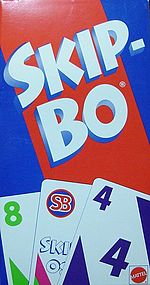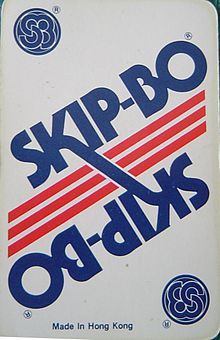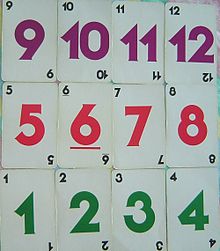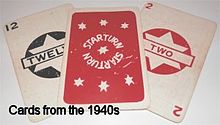
- Tabletop games
- Board games
- Tile-based games
- Turn-based games.html
- Abstract strategy games
- card games
- Connection games
- Mancala games
- Paper-and-pencil games
- Word games



 Cards in box
Cards in boxSKIP-BO /skip-bo/ is a commercial version of the card game Spite and Malice. In 1967, Minnie Hazel "Skip" Bowman of Brownfield, Texas began producing a boxed edition of the game under the name Skip-bo. In 1980 the game was purchased by International Games, which was subsequently bought by Mattel in 1992. A mobile version of the game for iOS was released by Magmic in September, 2013.
 Individual Card
Individual CardThe deck consists of 162 cards, twelve each of the numbers 1 through 12 and eighteen "SKIP-BO" wild cards which may be played as any number. Alternatively, the 162 cards could be three regular decks of playing cards, including the jokers, with ace to queen corresponding to 1 to 12 and the kings and jokers corresponding to the SKIP-BO cards. Before 1980, the commercial game consisted of three decks of regular playing cards with six SKIP-BO cards replacing the standard two jokers in each deck.
 Deck
DeckTwo to four people can play at a time as individuals, or, six or more players in teams (no more than three partnerships). The object of the game is to be the first player or team to play out their entire stock pile(s). Each player is dealt 30 cards for their pile with only the top card visible, and a hand of five cards, and the remaining cards are placed face down to create a common draw pile. The shared play area allows up to four build piles, which must be started using either a "1" card or a Skip-Bo, and each player also has up to four personal discard piles. Each turn the active player draws until they have five cards in hand, and plays on the build piles. They must play either the next card in sequential order or a wild Skip-Bo card, using either cards in hand, the top card of their stock pile, or the top card of any of their four discard piles. If the player can play all five cards from their hand, they draw five more and continues playing. When no more plays are available, the player discards one card to either an empty discard pile or on top of an existing one and play passes to the next player. When a build pile reaches 12, it is removed from the board and that space becomes empty for another pile to be started; play continues until one player has played their final start card.
If multiple games are going to be played then a point system may be used. After a player wins a game then he/she receives 25 points for winning plus 5 points for each card in his/her opponents' stock piles. The first player to reach 500 points wins.
Another option for game play is to pair up players as partners. Game play remains the same except:
Skip-Bo was released in the iTunes App Store on September 7, 2013. The game was developed by Magmic and licensed through Mattel. Various electronic handheld versions of Skip-Bo have been released over the years.
 Original cards for Starturn, from the 1940s and still in use.
Original cards for Starturn, from the 1940s and still in use.William Henry Storey designed a card game "Starturn" which was published by Chad Valley in 1935. Two packs, 44 black and 52 red, are used in a game primarily for two players although there were versions for three or four players. Black cards are divided equally between the players, placed face down with only the top card visible, as the Stack. Five red cards are dealt to each player, made up to five on each pass, and the rest placed as the draw Pack. The aim is to make up to four Build piles starting at 1 through to 15, using cards from the player's Stack where possible. Each player must discard one card at the end of each pass (except when all cards in the hand have been used on Build piles) on to one of four discard piles in front of each player, from which cards may be used (strictly, top card first) in forming Build piles. Completed Build piles are shuffled into the Pack as soon as completed. The first player to use up all his/her Stack cards is the winner. Although the cards are of different design, the rules of Skip-bo are almost exactly the same.